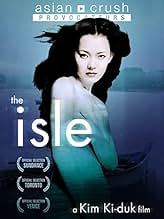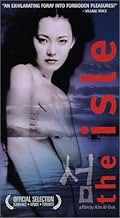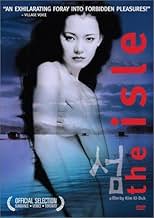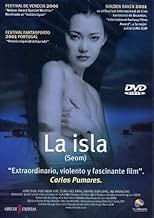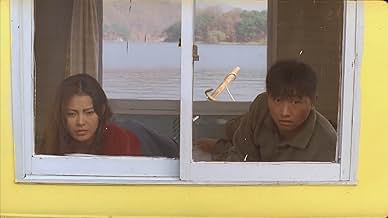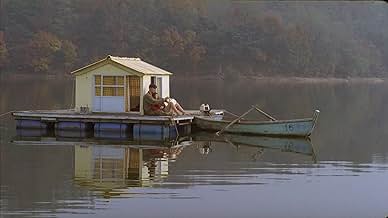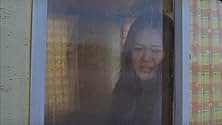IMDb रेटिंग
6.9/10
15 हज़ार
आपकी रेटिंग
एक शांत लेकिन लोगों की बीच शत्रुता के विभिन्न पहलुओं से घिरे स्थान पर फिशिंग रिसॉर्ट में काम करने के दौरान, एक जवान गूंगी महिला एक आदमी के साथ प्यार में पड़ जाती है, जो हत्या के लिए कानून से... सभी पढ़ेंएक शांत लेकिन लोगों की बीच शत्रुता के विभिन्न पहलुओं से घिरे स्थान पर फिशिंग रिसॉर्ट में काम करने के दौरान, एक जवान गूंगी महिला एक आदमी के साथ प्यार में पड़ जाती है, जो हत्या के लिए कानून से फरार है.एक शांत लेकिन लोगों की बीच शत्रुता के विभिन्न पहलुओं से घिरे स्थान पर फिशिंग रिसॉर्ट में काम करने के दौरान, एक जवान गूंगी महिला एक आदमी के साथ प्यार में पड़ जाती है, जो हत्या के लिए कानून से फरार है.
- पुरस्कार
- 6 जीत और कुल 7 नामांकन
फ़ीचर्ड समीक्षाएं
The Isle is a hard film to evaluate. It pulls the viewer's emotions in every different conceivable direction, from empathy to outright horror and everything in between. After it ended I wasn't sure if I was going to cry or to throw up; I didn't know if I was sad or happy or hopelessly angry. Either way, the film's images will probably haunt me for many years to come.
The film is beautifully photographed, making excellent use of the isolated fishing lake setting. All of the actors are perfect, even in scenes more painfully grotesque than anything I've seen in a film before. I simply cannot imagine the artistic process that went on during production-- how did the filmmakers raise the money to make this film, and how did they direct the actors to create such convincing performances from such outlandish material? And whose idea was it to end it like that?
I loved many things about this film, but I find it hard to recommend because of a few scenes involving really heartless animal cruelty. A fish is mutilated and partially eaten while it's still alive; a dog is yanked around by its collar and slapped; another fish is jolted with electrodes. Of course the humans in the film suffer much worse misfortunes, but the characters mostly deserve what they get, whereas the animals do not. Also, the scenes of human violence are created using makeup effects, but the animals have no such luck-- as far as I can tell, they're really slicing flesh off a live fish and eating it.
All I can really say is, see The Isle and make up your own mind about it. It will cause completely different individual reactions in every single member of the audience, and if you love it, good for you. If you hate it, I think I can understand why.
The film is beautifully photographed, making excellent use of the isolated fishing lake setting. All of the actors are perfect, even in scenes more painfully grotesque than anything I've seen in a film before. I simply cannot imagine the artistic process that went on during production-- how did the filmmakers raise the money to make this film, and how did they direct the actors to create such convincing performances from such outlandish material? And whose idea was it to end it like that?
I loved many things about this film, but I find it hard to recommend because of a few scenes involving really heartless animal cruelty. A fish is mutilated and partially eaten while it's still alive; a dog is yanked around by its collar and slapped; another fish is jolted with electrodes. Of course the humans in the film suffer much worse misfortunes, but the characters mostly deserve what they get, whereas the animals do not. Also, the scenes of human violence are created using makeup effects, but the animals have no such luck-- as far as I can tell, they're really slicing flesh off a live fish and eating it.
All I can really say is, see The Isle and make up your own mind about it. It will cause completely different individual reactions in every single member of the audience, and if you love it, good for you. If you hate it, I think I can understand why.
This is definitely not a film for all tastes. "The Isle" not only shows some of the most disturbing images on film but it also makes the viewer work hard to try and figure out what it all means. Especially the very last scene which I think was put there for each viewer to make they're own interpretation, as Kubrick did for the end of "2001, A Space Odyssey". Suh Jung plays Hee-Jin who rents out floating fish cabins and supplies bait, food and prostitutes. She also is a prostitute and she never utters a single word in the film. Some have called her character a mute but towards the end of the film she screams so I am thinking her silence might be of her own doing! She is attracted to one of the renters who is suicidal and is hiding out. Suh Jungs performance is very strong and its difficult to carry a film without speaking a word and the actor has to rely to a great length on how well and interesting the story is. Her performance reminds me of Isabelle Huppert in "The Piano Teacher". The amount of pain between the two characters is what they have in common. This is a film about relationships in a very strange setting with two strange people. Each character has a scene involving fish hooks and when they take place its up to the other character to try and ease the pain. Good cinematography with shots of the lake at dawn or sunset with mist and fog on the water. Very tough film to view with all the self mutilation and animal cruelty. For those of you who have viewed Asian films before then you should check out this very well made film.
Ki-duk Kim's "Seom"/"The Isle" has to be one of the most beautiful movies I have ever seen.The cinematography,the silence and the themes under the surface are incredible.The film explores human relationships and the pain of being in love,and being loved.Both characters(Hyun-shik and Hin-jin)are lost human beings searching for love.They crave love,yet shun it when it comes to them,as they are deeply aware of the destructive qualities it brings out in them.Suh-Shik Hwang's cinematography is absolutely beautiful and captures many impressive visuals.Still there are some horrific images that will shock casual viewer,so the viewer should be prepared.9 out of 10.
Wow, where to start with this. Ki Duk Kim has always been a divisive director, with his films showing slow burning, very natural, almost spiritual human traits. This though is like a magnified version of a Ki Duk Kim film. It's low budget, set in a single location, stunningly beautiful, very gruesome in parts, explicit and controversial. It centres around a lonely woman (Hee Jin) who delivers bait to tourist fisherman. What we see unfold is a symbolism heavy ride into a twisted / tumultuous relationship between Hee Jin and a visitor. It's full of breathtaking cinematography, sparse dialogue and one of the most stomach churning suicide attempts I've ever seen on screen. As usual with Ki Duk Kim, water as a symbol is featured heavily, and so are animals and nature. Quite why certain little creatures are sacrificed on screen I'm not sure though. A warning to anyone who is easily offended by animal cruelty - don't watch this movie.
What does it all mean in the end? I'm torn between it being an entire metaphor for how difficult relationships can be / an exploration into gender roles or a simple descent into madness tale. Maybe all 3. It is a heck of an experience though. Think of a Pedro Almodóvar movie mixed with a bit of Takashi Miike, maybe with a bit of Haneke in there too, and you may get the picture.
It's beautiful yet gruesome. I have to take a mark off for the animal cruelty, as it is bordering on unacceptable levels at times, but it still gets a 7.5/10
What does it all mean in the end? I'm torn between it being an entire metaphor for how difficult relationships can be / an exploration into gender roles or a simple descent into madness tale. Maybe all 3. It is a heck of an experience though. Think of a Pedro Almodóvar movie mixed with a bit of Takashi Miike, maybe with a bit of Haneke in there too, and you may get the picture.
It's beautiful yet gruesome. I have to take a mark off for the animal cruelty, as it is bordering on unacceptable levels at times, but it still gets a 7.5/10
Seom aka The Isle is written and directed by Korean film maker Ki-duk Kim. This bizarre film tells about happenings in strange fishing resort in which fishermen live and fish in floating cabins at daytime, and have fun and sex with local prostitutes at night time. The film's protagonist is an attractive, but very mysterious female (Suh Jung) who never talks, and works as some kind of "boat girl" who gets the food and prostitutes for the fishermen and other similar activities with her little boat. There is minimal amount of dialogue in The Isle, and it is hard to describe this ultra bizarre film after just one viewing.
The visuals are very astonishing and stunning as the settings are so atmospheric and natural. The calm mist and smoke above the water is very moody and even surreal, and this all is intensified even further by great use of camera, occasionally very weird angles and total feel of peace and magic. Blue is the main color in the film, and it is equally brilliant-looking as in many Hong Kong thrillers like Dr. Lamb by Danny Lee and Red to Kill by Billy Tang. The colors are always fantastic in Asian films, and The Isle once again proves and shows this. This film is a delight to the eye..at least before the infamous scenes involving fishing hooks.
The director has said that he wanted to depict relationships between men and women with this film, and that the film tells something about how dependent were are on each other, and especially on another sex. Once the first horrific "hook scene" comes, the only cure for his pain is the main female, who by giving him carnal pleasure, takes away or diminishes his pain - and vice versa later in the film. I think that this film is more feminist since the very surreal closing scene is so underlining as the man finally finds the "truth" and source of all life. Another reviewer thought that the end scene is gratuitous and only there to confuse things even further, and that may be the case, but still I want to interpret it as above, and it is very personal scene in depicting that eternal truth. Seeing is believing...
I think there's lot more than just this in the core of The Isle. The film really tells something about the relationship between humans and nature and nature's sources. There are many scenes depicting man exploiting nature and its inhabitants, and I think that the forthcoming scenes of mutilation are also symbolic as things turn upside down: humans become the victims of what they have practised and see the results. At this point, it is necessary to stress that there are many scenes of actual killing and off putting abuse of animals (mainly fish) which I, also, think are gratuitous since the message of the film is pretty hard to take since the film does the same exploitations it depicts committed by its characters. Then again, the killings show the real face of our world, since in order to stay alive, we have to use nature's resources and there's nothing wrong in that. So what's wrong in my opinion is that the animals in The Isle are not killed without pain and suffering, and that is not right nor human since I think that no living creature should die painfully or tortured. I wanted to think that the animals were not mutilated and killed in the film for real, but it all looks sadly too real. Still, I have to find the film's merits even though it becomes far more difficult when I remember these "animal snuff" scenes, that are unnecessarily explicit, albeit meant to be symbolic, which they of course are, if one can still accept this after the horrific imagery.
This film reminded me pretty much of Japanese film Naked Blood, which also is very beautiful and surreal film, but soon the horrific scenes of self mutilation and ultra splatter are on screen before the viewer's eyes. The self mutilations committed by fish hooks in The Isle are very gruelling to say the least, so this film will make the weakest viewers faint, as many festival screenings have proven. They are so sickeningly effective I wanted to stop thinking about what it would feel like to actually do something like that. Fish hooks are very small, but like Stuart Gordon has said (about the finger biting moment in Re-Animator), the smallest things may be the most horrific in many cases. These fish hooks really are symbolic as the humans are "turned to fishes" and get to see what they've done and created.
The Isle is very weird, bizarre, calm and also disturbing piece of cinema, and only minority of cinema lovers will stomach and appreciate films like The Isle. As I stressed earlier, I am sorry about the fact of animal mutilation presented in the film, and without those scenes, I would probably give more stars in the rating. Now it gets little less even if I wanted to give it more as a piece of art. 8/10 and to understand more about this film, it has to be seen many times since it unfolds pretty slowly.
The visuals are very astonishing and stunning as the settings are so atmospheric and natural. The calm mist and smoke above the water is very moody and even surreal, and this all is intensified even further by great use of camera, occasionally very weird angles and total feel of peace and magic. Blue is the main color in the film, and it is equally brilliant-looking as in many Hong Kong thrillers like Dr. Lamb by Danny Lee and Red to Kill by Billy Tang. The colors are always fantastic in Asian films, and The Isle once again proves and shows this. This film is a delight to the eye..at least before the infamous scenes involving fishing hooks.
The director has said that he wanted to depict relationships between men and women with this film, and that the film tells something about how dependent were are on each other, and especially on another sex. Once the first horrific "hook scene" comes, the only cure for his pain is the main female, who by giving him carnal pleasure, takes away or diminishes his pain - and vice versa later in the film. I think that this film is more feminist since the very surreal closing scene is so underlining as the man finally finds the "truth" and source of all life. Another reviewer thought that the end scene is gratuitous and only there to confuse things even further, and that may be the case, but still I want to interpret it as above, and it is very personal scene in depicting that eternal truth. Seeing is believing...
I think there's lot more than just this in the core of The Isle. The film really tells something about the relationship between humans and nature and nature's sources. There are many scenes depicting man exploiting nature and its inhabitants, and I think that the forthcoming scenes of mutilation are also symbolic as things turn upside down: humans become the victims of what they have practised and see the results. At this point, it is necessary to stress that there are many scenes of actual killing and off putting abuse of animals (mainly fish) which I, also, think are gratuitous since the message of the film is pretty hard to take since the film does the same exploitations it depicts committed by its characters. Then again, the killings show the real face of our world, since in order to stay alive, we have to use nature's resources and there's nothing wrong in that. So what's wrong in my opinion is that the animals in The Isle are not killed without pain and suffering, and that is not right nor human since I think that no living creature should die painfully or tortured. I wanted to think that the animals were not mutilated and killed in the film for real, but it all looks sadly too real. Still, I have to find the film's merits even though it becomes far more difficult when I remember these "animal snuff" scenes, that are unnecessarily explicit, albeit meant to be symbolic, which they of course are, if one can still accept this after the horrific imagery.
This film reminded me pretty much of Japanese film Naked Blood, which also is very beautiful and surreal film, but soon the horrific scenes of self mutilation and ultra splatter are on screen before the viewer's eyes. The self mutilations committed by fish hooks in The Isle are very gruelling to say the least, so this film will make the weakest viewers faint, as many festival screenings have proven. They are so sickeningly effective I wanted to stop thinking about what it would feel like to actually do something like that. Fish hooks are very small, but like Stuart Gordon has said (about the finger biting moment in Re-Animator), the smallest things may be the most horrific in many cases. These fish hooks really are symbolic as the humans are "turned to fishes" and get to see what they've done and created.
The Isle is very weird, bizarre, calm and also disturbing piece of cinema, and only minority of cinema lovers will stomach and appreciate films like The Isle. As I stressed earlier, I am sorry about the fact of animal mutilation presented in the film, and without those scenes, I would probably give more stars in the rating. Now it gets little less even if I wanted to give it more as a piece of art. 8/10 and to understand more about this film, it has to be seen many times since it unfolds pretty slowly.
क्या आपको पता है
- ट्रिवियाThis fell foul of the British Board of Film Classification who demanded cuts, not because of the scene where a metal object is inserted into a vagina but of cruelty to fish, which director Kim Ki-duk admitted was genuine.
- इसके अलावा अन्य वर्जनThe cut UK print was submitted to the Irish censor who cited the violence as causing concern - he gave the distributor (Tartan Films) two options:
- Resubmit the same version (presumably for an appeal/reconsideration)
- Submit an altered version to secure a certificate
- कनेक्शनReferenced in Spring, Summer, Fall, Winter... and Spring (2003)
टॉप पसंद
रेटिंग देने के लिए साइन-इन करें और वैयक्तिकृत सुझावों के लिए वॉचलिस्ट करें
- How long is The Isle?Alexa द्वारा संचालित
विवरण
बॉक्स ऑफ़िस
- बजट
- $10,00,000(अनुमानित)
- US और कनाडा में सकल
- $20,666
- US और कनाडा में पहले सप्ताह में कुल कमाई
- $4,546
- 25 अग॰ 2002
- दुनिया भर में सकल
- $24,963
- चलने की अवधि1 घंटा 30 मिनट
- रंग
- ध्वनि मिश्रण
- पक्ष अनुपात
- 1.85 : 1
इस पेज में योगदान दें
किसी बदलाव का सुझाव दें या अनुपलब्ध कॉन्टेंट जोड़ें




